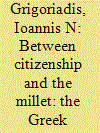|
|
|
Sort Order |
|
|
|
Items / Page
|
|
|
|
|
|
|
| Srl | Item |
| 1 |
ID:
180025


|
|
|
|
|
| Summary/Abstract |
As one of Turkey’s non-Muslim minorities, Turkey’s Greeks have faced substantial pressures since the founding of republican Turkey. As its members could not claim their constitutional rights as citizens of Turkey, emigration soared and the minority reached a point of near extinction. Significant improvements were noted when the EU-supported reform transformed the Turkish state and society from 1999 to 2010, which were not reversed as Turkey relapsed to democratic backsliding in the following years. This article explores the social dynamics and ideological frameworks that have contributed to novel perceptions of the Greek minority since after 2002, the year the Justice and Development Party (Adalet ve Kalkınma Partisi-AKP) came to power and have deterred a significant deterioration since Turkey’s democratic backsliding began. It also examines the state of Turkey’s Greeks by focusing on the state of the pious foundations, the Papa Eftim affair and the situation in the islands of Gökçeada (Imbros) and Bozcaada (Tenedos).
|
|
|
|
|
|
|
|
|
|
|
|
|
|
|
|
| 2 |
ID:
191894


|
|
|
|
|
| Summary/Abstract |
Employing a historical perspective and using documents from the Ottoman archives, this article focuses on the recognition of the Vlachs as millet by the Sultan Abdülhamid in 1905. It examines in detail the policies of the Sublime Porte, Romania, and the Ecumenical Patriarchate, which was the highest body within Orthodox Christianity. The study also tries to show the common fate of the Ecumenical Patriarchate and the Ottoman Empire in the face of rising nationalisms and the Ottoman “breaking no squares” policy toward to the Ecumenical Patriarchate. From 1878, newly independent Romania had initiated a paternalistic policy in support of the Vlachs of Macedonia including their desire to gain recognition of their right to have their own schools, churches, clerics, and so on. Yet, seeking this objective exacerbated already existing nationalist conflicts in the region among the Serbs, Bulgarians, and Greeks. The setting for this rivalry was mainly Salonica, Bitola, and the Ioannina provinces. This article argues that when Alexandru Lahovary arrived in Istanbul in 1902 as the new Romanian diplomatic representative he had as his major aim obtaining Ottoman recognition of the Vlachs as a millet, like the Greeks, Armenians, Bulgarians, and other minorities already enjoyed. Remarkably, Lahovary’s determined diplomatic and other efforts achieved his target in a mere three years. Still, after the Balkan Wars, Greece emerged as the real winner, and captured a huge part of Macedonia, which effectively took the Vlachs off the Balkan agenda.
|
|
|
|
|
|
|
|
|
|
|
|
|
|
|
|
|
|
|
|
|